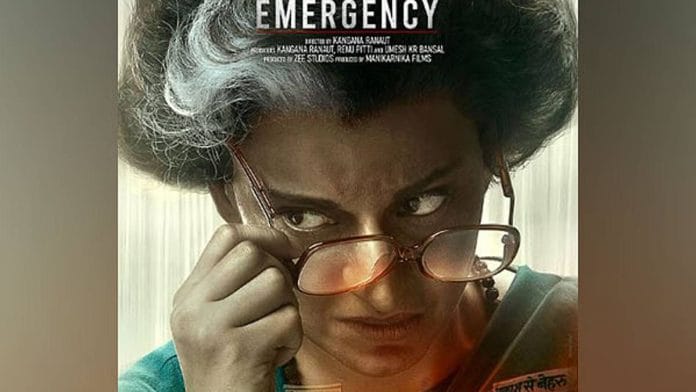After receiving no response on her legal notices, veteran journalist and author Coomi Kapoor has filed a lawsuit against actor and BJP MP Kangana Ranaut’s Manikarnika Films Pvt Ltd and streaming platform Netflix. Kapoor has accused both parties of breaching their contract and damaging her reputation by stating that the film Emergency is based on her book The Emergency: A Personal History.
Kapoor’s The Emergency, published by Penguin in 2015 and offering a detailed account of the 1975-77 Emergency period, was based on her extensive research and personal experience during that period. It received critical acclaim from leading scholars and journalists such as Pratap Bhanu Mehta, Karan Thapar, Sunanda K Dutta Ray and Anil Padmanabhan.
According to the author, Ranaut’s Emergency is riddled with “historical inaccuracies,” and her book is being blamed for them. She emphasized that the film’s misrepresentations showcase a serious breach of trust.
“I phoned Kangana Ranaut’s brother, Aksht Ranaut, who is the producer. But have received no response till this morning,” Kapoor told ThePrint on Tuesday, adding that the notices were sent earlier this month.
“This could have easily been avoided if the script writer had even done a cursory reading of the book in which the accurate data is given.”
Also read: Kesari 2 to Akaal, Karan Johar’s Punjab project isn’t paying off
Breach of contract
Kapoor recalled that it was Aksht Ranaut who met her in Mumbai in 2021, seeking permission to buy the rights of her book to utilise a single chapter that dealt specifically with Indira Gandhi.
Kapoor signed a “tripartite contract” with Manikarnika Films and Penguin. But she included two key clauses in the contract, which as per her, were breached.
While the producers would of course have full artistic license in making the film, “nothing should be modified that was not in consonance with historical facts on the subject, which are in the public domain,” she said.
The contract, according to Kapoor, also mentioned that the author’s name and book should not be used for promoting or exploiting the book without the author’s written consent.
“I had specifically told them to not use the term ‘based on’ but they still did,” the veteran journalist said. Additionally, the author was never shown the film script and she discovered only after the film’s Netflix release on 17 March that it prominently credited her book as its basis.
“When the film was released I checked the media articles and they all said ‘inspired’ so I was fine. But, when I recently watched it on Netflix, it read “based on” towards the end. In order to give credibility to their work, they used my name,” Kapoor said.
Notably, Emergency on Netflix, came with a disclaimer: “The film is inspired by the book ‘The Emergency’ by Coomi Kapoor and ‘Priyadarshani’ by Jaiyanth Vasant Shinde.” But the disclaimer then towards the end reads, “The film ‘Emergency’ is based on the books “The Emergency” by Coomi Kapoor and “Priyadarshani” by Jaiyanth Vasant Shinde.”
Also read: Thug Life is Kamal Haasan’s peace offering to fans who waited for Mani Ratnam collab
Akbar Ahmed portrayal, timeline errors
Among the inaccuracies, Kapoor pointed out is the film’s depiction of Akbar Ahmed, a close ally of Sanjay Gandhi, being responsible for banning Kishore Kumar’s songs on All India Radio.
Kapoor clarified that her book clearly attributes the decision to then Information and Broadcasting Minister V.C. Shukla. The author revealed that Ahmed himself questioned her about the claim, after watching Ranaut’s Emergency.
“I had to explain that my book never made such a claim,” she said. “He wasn’t the only one. Many people have called me saying, ‘what have you written in the book?’,”
Other distortions, according to Kapoor, include the portrayal of journalist Nikhil Chakravarty being imprisoned during the Emergency — when he was not — and also a misrepresentation of the timeline with respect to Emergency’s revocation and the 1977 elections.
Kapoor noted that even though she had sent legal notices to Netflix and Manikarnika Films earlier this month demanding the removal of the “based on” credit, they didn’t pay heed to it.
“I just want to set a precedent for how creative works based on nonfiction should be treated,” she said.
(Edited by Anurag Chaubey)






